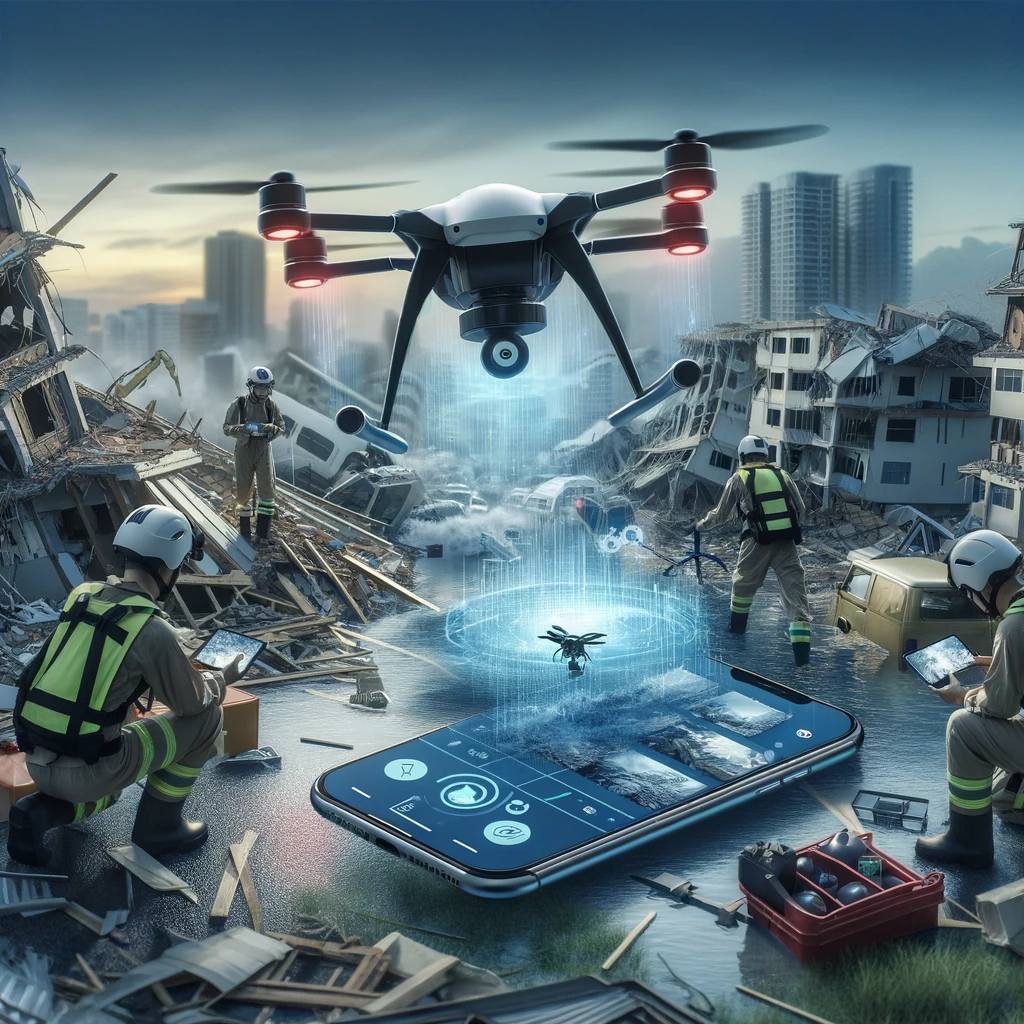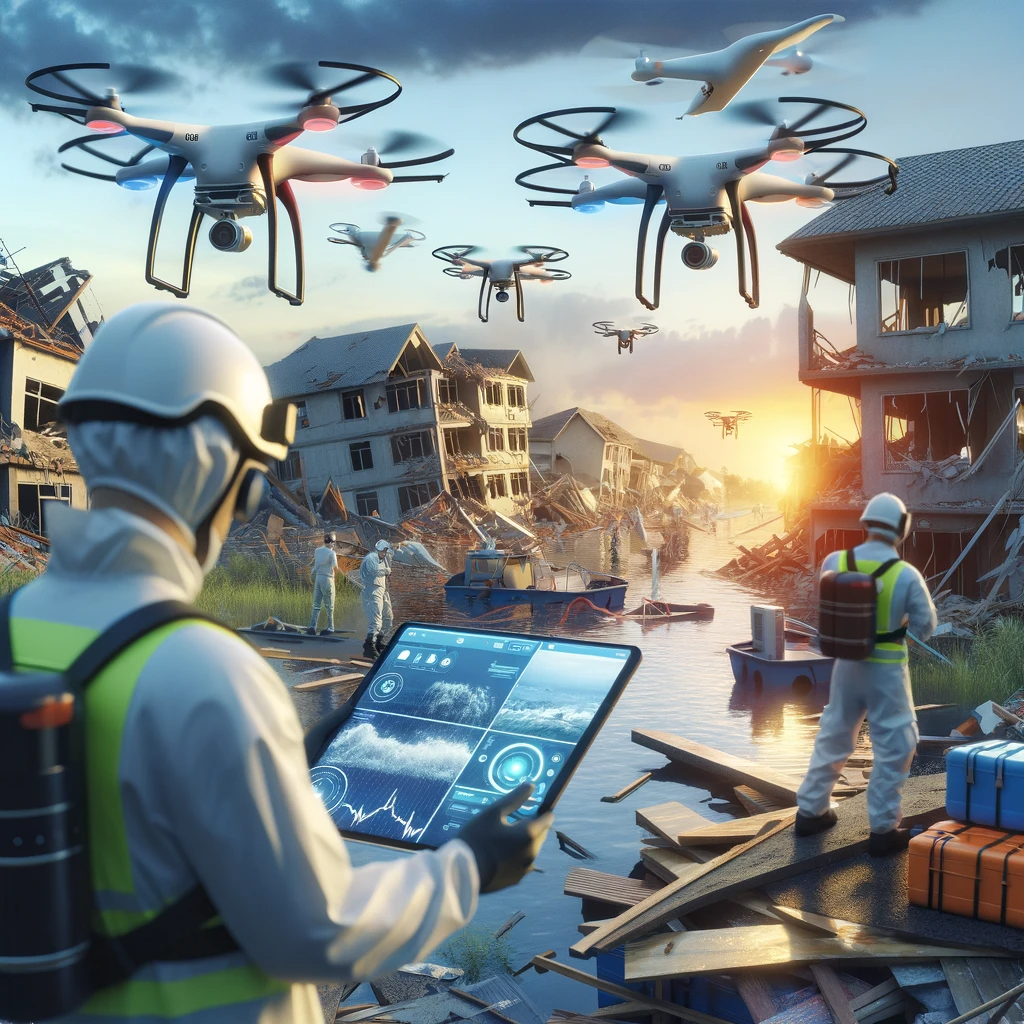Natural disasters and emergencies can strike without warning, causing widespread devastation and posing significant challenges to response efforts. However, as technology continues to advance, Artificial Intelligence (AI) is emerging as a powerful tool in enhancing disaster response and emergency management. In this three-part series, we will explore the potential of AI across the entire spectrum of disaster management, from prediction and preparedness to response and recovery.
Predicting Disasters with AI
Harnessing Big Data
AI leverages big data analytics to process vast amounts of information from various sources, including weather data, satellite imagery, and historical records. This allows for more accurate predictions of potential disasters, such as hurricanes, floods, and wildfires.
Early Warning Systems
AI-driven early warning systems can provide timely alerts to communities in the path of impending disasters. These systems are capable of predicting the trajectory and intensity of events, giving authorities and residents valuable time to prepare and evacuate if necessary.
AI in Disaster Preparedness
Risk Assessment and Vulnerability Mapping
AI helps in assessing the vulnerability of communities and infrastructure to specific types of disasters. By analyzing data, it can identify areas at higher risk and recommend mitigation measures.
Simulation and Training
AI-based simulations allow emergency responders to train for various disaster scenarios, improving their preparedness and coordination. These simulations help identify potential challenges and optimize response strategies.
AI in Disaster Response
Coordination and Resource Allocation
During a disaster, AI algorithms assist in coordinating response efforts. They can optimize resource allocation, ensuring that emergency personnel, equipment, and supplies are deployed efficiently to areas in need.
Predictive Analytics for Response
AI analyzes real-time data from disaster-affected areas to predict potential secondary impacts, such as disease outbreaks or infrastructure failures. This information helps responders prioritize their actions.

AI-Powered Disaster Response
Drone Technology and Surveillance
Drones equipped with AI-powered cameras and sensors are deployed in disaster-affected areas to provide real-time aerial imagery. This data assists response teams in assessing the extent of damage, locating survivors, and identifying blocked roads or infrastructure issues.
Natural Language Processing for Emergency Calls
AI-driven natural language processing (NLP) technology is used to analyze emergency calls and texts. It can identify key information, such as the location of the emergency and the type of assistance required, helping dispatchers prioritize and coordinate responses effectively.
Case Studies: AI in Disaster Response
Hurricane Tracking and Evacuation
AI algorithms analyze meteorological data to predict the path and intensity of hurricanes. These predictions enable timely evacuations and resource allocation, ultimately saving lives and reducing property damage.
Earthquake Early Warning
In earthquake-prone regions, AI-based seismic sensors can detect the initial shockwaves and transmit alerts seconds before the more destructive waves arrive. This early warning can provide crucial seconds for people to take cover.
AI-Powered Robotics
Robotic devices, controlled by AI, are utilized in search and rescue missions. They can navigate hazardous environments, locate survivors, and even provide limited medical assistance until human responders arrive.
AI in Disaster Recovery
Data-Driven Recovery Planning
After a disaster, AI processes extensive data to assist in recovery planning. It identifies areas that need immediate attention, estimates repair costs, and predicts long-term recovery needs.
Infrastructure Resilience
AI-driven simulations help assess the resilience of critical infrastructure such as bridges, dams, and power grids. By identifying vulnerabilities, authorities can prioritize upgrades and improvements to prevent future disasters.
Psychological Support
AI chatbots and virtual assistants provide psychological support to survivors dealing with trauma. These tools offer a confidential platform for people to express their feelings and access information on coping strategies.
AI-Powered Disaster Recovery
Rapid Damage Assessment
AI-driven image recognition and analysis enable rapid assessment of damage to infrastructure, buildings, and roads. This information guides recovery efforts, ensuring that resources are directed to areas in most need.
Supply Chain Optimization
AI optimizes supply chain logistics for delivering aid and resources to disaster-affected regions. Predictive algorithms anticipate demand and identify the most efficient routes for transport.
Building Resilience with AI
Climate Change Modeling
AI-powered climate models help predict future weather patterns and assess their impact on disaster risk. This knowledge informs urban planning and infrastructure development with a focus on resilience.
Early Warning Systems
AI-enhanced early warning systems continually improve their accuracy and scope. From floods to wildfires, these systems offer valuable time for communities to prepare and respond.
Case Study: Flood Resilience
In flood-prone regions, AI-driven flood modeling combines weather forecasts, terrain data, and historical flood patterns to predict and mitigate flood risks. Flood defenses, such as levees and drainage systems, are optimized to enhance resilience.
Long-Term Preparedness
Simulation and Training
AI-powered simulations allow emergency responders to train for various disaster scenarios. These exercises help refine response strategies and identify areas for improvement.
Community Engagement
AI platforms engage communities in disaster preparedness efforts. They provide information, resources, and guidance, empowering individuals to take proactive steps to protect themselves and their communities.
The Future of AI in Disaster Management
As technology evolves, AI’s role in disaster management will continue to expand. Advanced AI models, including machine learning and neural networks, will enhance prediction accuracy, and AI-driven robotics will become more sophisticated in search and rescue missions.
‘
Ethical Considerations
While AI offers tremendous potential in disaster management, ethical considerations must be addressed. Data privacy, bias in AI algorithms, and equitable access to technology are essential aspects to consider in disaster response and recovery efforts.
Conclusion
Artificial Intelligence has emerged as a powerful ally in managing natural disasters and emergencies. From predicting and preparing for disasters to responding effectively and building long-term resilience, AI offers a suite of tools and solutions that can save lives and reduce the impact of catastrophic events.
As we look to the future, the continued development and responsible use of AI in disaster management hold the promise of making our communities safer, more resilient, and better prepared to face the challenges of an uncertain world.
Thank you for joining us on this journey through the potential of AI in disaster management. Stay informed and engaged as we navigate the evolving landscape of technology and its impact on our lives.
